Schema.org has a concept of a DataType, things like Text, Number, Date,
etc. In JSON-LD, we represent these as strings or numbers, rather than array or
object literals. This data could describe the name of a Person, a check-in
date and time for a LodgingReservation, a URL of a Corporation, publication
date of an Article, etc. As we’ll see, the Schema.org DataType hierarchy is
far richer than TypeScript’s type system can accommodate. In this article, we’ll
go over the DataType hierarchy and explore how much type checking we can
provide.
We saw in the first installment how TypeScript’s type system makes expressing JSON-LD describing Schema.org class structure very elegant. The story got slightly more clouded when we introduced Schema.org Enumerations.
Schema.org Data Types
Let’s take a look at the
fullDataTypetree according Schema.org:
Boolean’s look quite similar to enums, with http://schema.org/True and
http://schema.org/False as it’s two possible IRI values (depending on
@context, those can of course be represented as relative IRIs instead) or
their HTTPS equivalents.
Number and descendants are just JSON / JavaScript numbers. Float indicates
the JSON number will have a floating point precision, whereas Integer tells us
to expect a whole number. On its own right, JavaScript does not distinguish
floats and integers as separate types, and neither does TypeScript. While
TypeScript supports the idea of
literal types,
specifying a type as all possible integers or all possible floating point
numbers isn’t expressible.
Text and descendants are just JSON / JavaScript strings. Similar to above,
TypeScript does not support more specific string types based on their pattern
(RegEx or otherwise).
Date, DateTime, and Time are all expressed as JSON / JavaScript strings as
well. Those are expected to be formatted in
ISO 8601 date or time formats, or
similar.
Simply put, TypeScript lacks a cohesive type hierarchy under string and
number that can sufficiently express Date, DateTime, Time, and the
sub-classes of Number and Text. Only Number, Text, and Booleans are
sufficiently represented by the type system.
Biting the Bullet
So far, the invariant we have tried to maintain with our TypeScript definition is that: Every JSON literal matching the Schema type is valid Schema.org JSON-LD literal (In the case of enums, we even accepted asubsetof legal literals.)
One option is to introduce factories, e.g. a date(2019, 01, 01) or similar to
create a matching Date type. Part of the original goal of these type
definitions, however, is to allow the developer to write literals as they would
in regular JSON-LD, and just have schema-dts function as a type checker on top
of these.
With that, I decided that it is more desirable to bite the bullet (hoping at least that the Integer and Float case to be resolved by the TypeScript team) and leave my typings more permissive than valid Schema.org, for once.
The implication, here, is that the typings for the basic data types are equivalent to something like this:
// Text and Derivatives:
export type Text = string;
export type CssSelectorType = Text;
export type URL = Text;
export type XPathType = Text;
// Number and Derivatives:
export type Number = number;
export type Integer = Number;
export type Float = Number;
// Date, etc.
export type Date = string;
// Booleans:
export type Boolean {
True = "https://schema.org/True",
False = "https://schema.org/False",
}
While run-time behaviors can give us nicer properties, with TypeScript, this is the best we can do compile-time.
